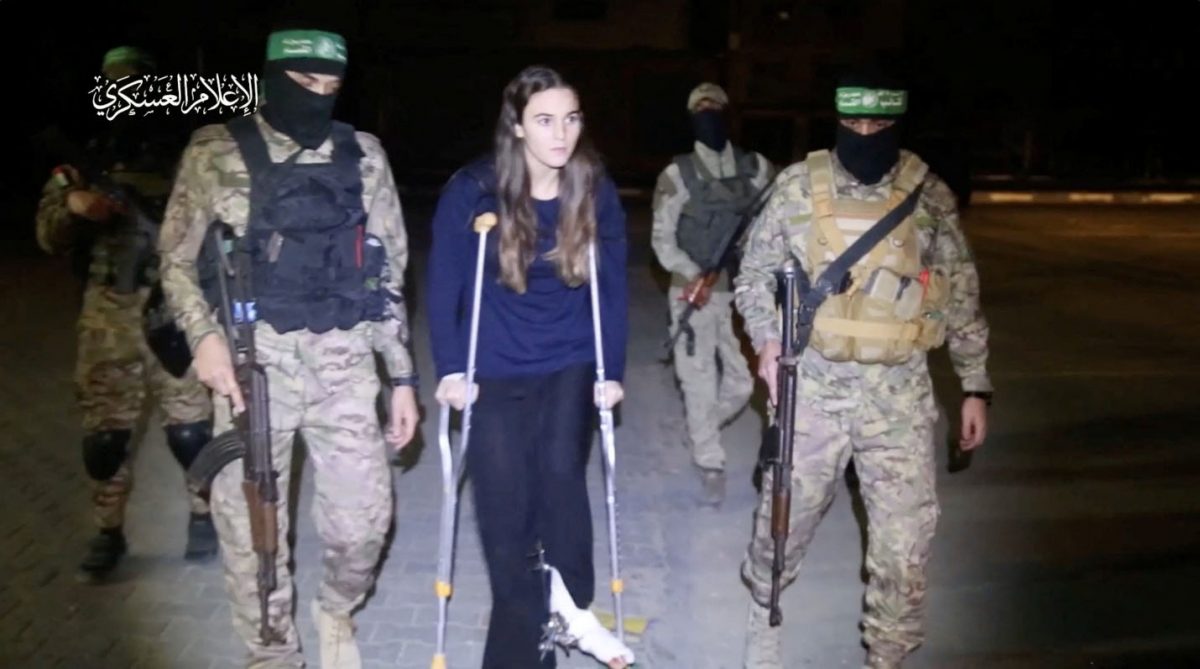GAZA/JERUSALEM, (Reuters) – Thirteen Israelis and four Thai nationals released from Hamas captivity arrived in Israel last night in the second step of a crucial hostage deal that briefly risked falling apart due to a dispute over the delivery of aid supplies into Gaza.
The short-lived dispute that threatened the temporary truce to free captives was overcome with the mediation of Qatar and Egypt, but it underscored the fragility of the agreement, under which a total of 50 Israeli hostages are to be exchanged for 150 Palestinian prisoners over four days.
Television footage showed hostages on the Egyptian side of the Rafah border crossing after leaving Gaza, as Hamas handed over the captives to the International Committee of the Red Cross late on Saturday. Of the 13 Israelis released, six were women and seven were children and teenagers.
“The released hostages are on their way to hospitals in Israel, where they will reunite with their families,” the Israel Defense Forces (IDF) said in a statement.
Among the Palestinian prisoners released from two Israeli prisons, six were women and 33 were minors, the Palestinian news agency WAFA reported. Some of those released arrived at Al-Bireh Municipality Square in Ramallah in the Israeli-occupied West Bank, where thousands of citizens were waiting for them, according to a Reuters witness.
A Palestinian official familiar with the diplomacy said Hamas would continue with the four-day truce agreed with Israel, the first halt in fighting since Hamas fighters rampaged through southern Israel on Oct. 7, killing 1,200 people and taking about 240 hostages.
In response to that attack, Israel has vowed to destroy the Hamas militants who run Gaza, raining bombs and shells on the enclave and launching a ground offensive in the north. To date, some 14,800 people, roughly 40% of them children, have been killed, Palestinian health authorities said on Saturday.
Saturday’s swap comes after the initial release of 13 other Israeli hostages including children and the elderly by Hamas on Friday in return for the release of 39 Palestinian women and youth from Israeli prisons.
Hamas on Friday also released 10 Thai farm workers and a Filipino.
The deal ran the risk of derailment earlier yesterday after the armed wing of Hamas said it was delaying the scheduled second round of hostage releases until Israel met all truce conditions, including committing to let aid trucks into northern Gaza.
Hamas spokesperson Osama Hamdan said only 65 of 340 aid trucks that had entered Gaza since Friday had reached northern Gaza, which was “less than half of what Israel agreed on.”
The IDF said that inside the Gaza Strip distribution of the aid was implemented by the United Nations and international organizations.
The United Nations said 61 trucks of aid were delivered to northern Gaza on Saturday, the largest number since Oct. 7. They included food, water and emergency medical supplies.
Al-Qassam Brigades, the Hamas armed wing, also said Israel had failed to respect the terms of the Palestinian prisoner releases and that prisoners were not freed based on their time in detention.
Qatari foreign ministry spokesman Majed Al-Ansari on Saturday said there been “a lot of discussion” on how and whom to prioritize for release, and on the Palestinian side, a key criterion was the length of time spent in Israeli prisons.
“We are now hopeful that with the second or the third day of this pause, we would be able to hash out a lot of these details that made this day so difficult,” he told CNN.
Ensuring that the deal did not collapse took a day of high-stakes diplomacy mediated by Qatar and Egypt, a process in which U.S. President Joe Biden also participated by calling Qatari Emir Sheikh Tamim bin Hamad Al Thani.
Israel has said the ceasefire could be extended if Hamas continues to release hostages at a rate of at least 10 per day. A Palestinian source has said up to 100 hostages could go free.
While Saturday was a day of high-anxiety diplomacy for mediators, it meant hours of nail-biting waiting for the families of hostages. For some, joy was overshadowed by the continued captivity of others.
“My heart is split because my son, Itay, is still in Hamas’ captivity in Gaza,” Mirit Regev, mother of Maya Regev, who was among those released late on Saturday, said in a statement released by Hostage and Missing Families Forum, a platform set up to represent the families.
Among those released was 9-year-old Irish-Israeli hostage Emily Hand, who was initially thought to have been killed. She spent her ninth birthday in captivity and was released alongside 12-year-old Hila Rotem, whose mother remains in captivity.
“We are overjoyed to embrace Emily again, but at the same time, we remember Raya Rotem and all the hostages who have yet to return,” Hand’s family said in a statement.
For Palestinians, joy at the release of prisoners from Israeli jails had a bitter tinge.
In comments to Al Jazeera TV from her home, freed prisoner Shorouk Dwayyat, who had served half of her 16-year prison term, said she felt joy mixed with pain. “I feel like I am in a dream, but I hope that the war on Gaza will stop as soon as possible.”






